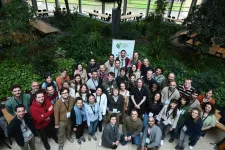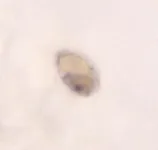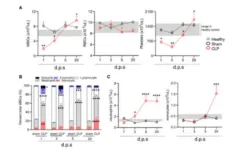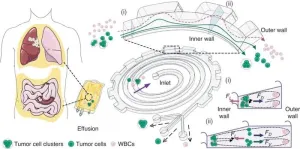(Press-News.org) B-Cubed’s Hackathon – “Hacking Biodiversity Data Cubes for Policy” – concluded successfully on 5 April in Brussels. The event marked a significant milestone in the use of data cubes for enhancing biodiversity data analysis and policy-making. Over four days, participants from diverse backgrounds collaborated to explore innovative solutions aimed at standardising and improving the accessibility of biodiversity data.
The event began with a foundational presentation on data cubes by Andrew Rodrigues from GBIF, preparing participants for the challenges ahead. Ten teams, comprising both coding professionals and enthusiasts, worked diligently on their projects, benefiting from expert panels by Evangelia Drakou (Harokopio University of Athens), Lucy Bastin (Aston University) and Yanina Sica (Justus-Liebig University of Giessen), who provided guidance and insights on various topics.
The Hackathon’s finale was marked by a presentation session where teams showcased their solutions to a jury of experts. Criteria for evaluation included the integration of data cubes, innovation in addressing biodiversity challenges, and the clarity of solution visualisation for policy impact. The following teams were recognised for their outstanding contributions to the field of biodiversity data analysis:
First category: Interoperability and integration
#9 Species occurrence cube portability
#10 Effects of integrating species occurrences from different sources into Data Cubes: facilitating detection of data balance, biases, scale and other effects.
#7 Interoperable eLTER Standard Observation variables for Biosphere
Second category: Monitoring and modelling
#4 Irokube: Deep-SDM and Critical Habitats Mapping Empowered by Data Cubes
#6 Phenological Diversity trends by remote sensing-related datacubes
#5 Tackling Ocean Biodiversity Crisis with Marine Data B-Cubes
Third category: Visualisation and training
#2+8 Unveiling Ecological Dynamics Through Simulation and Visualization of Biodiversity Data Cubes & Virtual B3 - How reliability and uncertainty of biodiversity sampling affect SDM: build virtual species to cope with real problems!
#11 GUI for general biodiversity indicators
#5 Tackling Ocean Biodiversity Crisis with Marine Data B-Cubes
This event emphasised the potential of data cubes in addressing complex biodiversity issues, demonstrating the importance of collaborative problem-solving and cross-disciplinary approaches. The winning projects illustrated the versatility and impact of data cubes in facilitating informed policy-making and biodiversity conservation efforts.
The hackathon surpassed our hopes in creating innovative ideas for the use of biodiversity data cubes!
– Quentin Groom, Meise Botanic Garden, B-Cubed’s coordinator
B-Cubed appreciates the commitment of all participants, experts, and supporting partners involved in the Hackathon. The engagement and outcomes of this event reflect a shared commitment to advancing the understanding and conservation of biodiversity through technological innovation.
Further details about the Hackathon and the participating teams can be found on the B-Cubed website.
---------------------------------------------------------------------------------------------------------------------------------------------------
This project receives funding from the European Union’s Horizon Europe Research and Innovation Programme (ID No 101059592). Views and opinions expressed are those of the author(s) only and do not necessarily reflect those of the European Union or the European Commission. Neither the EU nor the EC can be held responsible for them.
The Hackathon was made possible with the funding of the European Union and the support of the Research Foundation - Flanders (FWO).
END
Advancing biodiversity data analysis at B-Cubed’s Hackathon
The dynamic four-day event bridged technology and conservation, creating solutions for biodiversity challenges through the innovative use of data cubes
2024-04-11
ELSE PRESS RELEASES FROM THIS DATE:
Hypertensive disorders of pregnancy increase risk of cardiovascular death after giving birth
2024-04-11
Rutgers Health researchers have found that hypertensive disorders in pregnancy are strongly associated with fatal cardiovascular disease for up to a year after birth.
Among the hypertensive disorders that cause dangerously high blood pressure during pregnancy — chronic hypertension, gestational hypertension, preeclampsia without severe features, preeclampsia with severe features, superimposed preeclampsia and eclampsia — all but gestational diabetes were associated with a doubling in the risk of fatal cardiovascular disease compared to women with normal blood pressure.
Eclampsia, a condition whereby hypertensive ...
Blood stem cells unlock clues for helping sepsis patients fight recurring infections
2024-04-11
Severe sepsis from bacterial or viral infections can be life-threatening and even people recovering from severe sepsis may experience long-lasting effects on the immune system, making them more susceptible to recurrent infections. The causes for this sepsis-induced immune suppression are not well understood and lack an effective treatment. To better understand the cause, Katherine MacNamara and colleagues from Albany Medical College, USA, analyzed the blood stem cells of mice with prior sepsis and their results were recently published in the journal Stem Cell Reports.
During ...
Climate: Increased threat to coastlines from concurrent heatwaves and sea level rises
2024-04-11
Concurrent occurrences of heatwaves and extreme short-term sea level rises at the same coastal locations significantly increased between 1998 and 2017 when compared to the preceding twenty years, reports a study published in Communications Earth & Environment. The study also suggests that these events may be five times more likely to occur between 2025 and 2049 under a modelled high emissions scenario.
A so-called ‘concurrent heatwave and extreme sea level’ (CHWESL) event is when a heatwave and an extreme short-term sea level rise occur at the same coastal location over the same time period. Although they ...
Second primary breast cancer in young breast cancer survivors
2024-04-11
About The Study: The results of this study suggest that young breast cancer survivors without a germline pathogenic variant have a low risk of developing a second primary breast cancer in the first 10 years after diagnosis. Findings from germline genetic testing may inform treatment decision-making and follow-up care considerations in this population.
Authors: Kristen D. Brantley, Ph.D., M.P.H., of the Harvard T. H. Chan School of Public Health in Boston, is the corresponding author.
To access ...
Physician empathy and chronic pain outcomes
2024-04-11
About The Study: In this study that included 1,470 adults with chronic low back pain, physician empathy was associated with better outcomes over 12 months. Greater efforts to cultivate and improve physician empathy appear warranted.
Authors: John C. Licciardone, D.O., M.S., M.B.A., of the University of North Texas Health Science Center at Fort Worth, is the corresponding author.
To access the embargoed study: Visit our For The Media website at this link https://media.jamanetwork.com/
(doi:10.1001/jamanetworkopen.2024.6026)
Editor’s ...
Tropical coral-infecting parasites discovered in cold marine ecosystems
2024-04-11
Parasites thought only to infect tropical coral reefs have been discovered in a large variety of creatures in cold marine ecosystems along the Northeast Pacific, according to new research from University of British Columbia botanists.
The finding, published today in Current Biology, greatly expands the range of corallicolids, suggesting the parasites infect a range of organisms related to coral, like sea anemones and other cold-water marine invertebrates, around the world.
“This highlights significant blind spots in our strategies designed to sample microbial biodiversity,” says University of British Columbia biodiversity researcher Dr. Patrick Keeling, senior author on the ...
Successful murine model of dermatomyositis reveals underlying immune system involvement
2024-04-11
Researchers from Tokyo Medical and Dental University (TMDU) have developed a murine model for a highly progressive disease called “anti-MDA5 antibody-positive dermatomyositis”, providing insights into underlying biological mechanisms and aiding treatment
Tokyo, Japan – Some diseases involve autoimmune reactions, when the body begins to attack its own cells and proteins. The biological mechanisms underlying these diseases are often unknown, making treatment challenging. Now, a group at TMDU has created a murine model for a disease ...
Next-gen lab chip transforms cancer detection: triple-threat cell sorting unveiled
2024-04-11
Researchers have unveiled a microfluidic device that significantly improves the separation of tumor cells and clusters from malignant effusions. This novel technology promises to advance the diagnosis and treatment monitoring of cancer by enabling the high-throughput, continuous-flow ternary separation of single tumor cells, tumor cell clusters, and white blood cells (WBCs) from clinical pleural or abdominal effusions.
Understanding the nature of malignant effusions, teeming with tumor cells and clusters, is critical in comprehending the breadth of cancer's impact. The significant role of tumor clusters, with their heightened potential ...
NCCN 2024 Annual Conference shares cancer care updates for practical, immediate use in practice
2024-04-11
PLYMOUTH MEETING, PA [April 11, 2024] — The National Comprehensive Cancer Network® (NCCN®)—an alliance of leading cancer centers—hosted more than 1,700 oncology professionals during the NCCN 2024 Annual Conference on April 5-7. The yearly meeting includes opportunities for care providers to interact with world-renowned specialists on the latest evidence-based expert consensus recommendations for delivering high quality, patient-centered cancer care. Sessions focused on practical applications for improving care at every level, including clinical and administrative ...
Genetic underpinnings of environmental stress identified in model plant
2024-04-11
Plants can be temperamental. Even weeds along the side of highways or pushing their way up in the cracks of concrete sidewalks can get stressed out by dehydration, cold, excess salt and more. Researchers at Hiroshima University have identified 14 genes that thale cress — a plant commonly used in genetic investigations since its genome is well documented — express more when responding to five specific stressors, as well as eight genes that the plant suppresses.
They published their results on March 22 in Frontiers in Plant Science.
“Abiotic stresses — as opposed to biotic stresses like pests or disease — such as drought, salinity and cold negatively ...
LAST 30 PRESS RELEASES:
Scientists show how to predict world’s deadly scorpion hotspots
ASU researchers to lead AAAS panel on water insecurity in the United States
ASU professor Anne Stone to present at AAAS Conference in Phoenix on ancient origins of modern disease
Proposals for exploring viruses and skin as the next experimental quantum frontiers share US$30,000 science award
ASU researchers showcase scalable tech solutions for older adults living alone with cognitive decline at AAAS 2026
Scientists identify smooth regional trends in fruit fly survival strategies
Antipathy toward snakes? Your parents likely talked you into that at an early age
Sylvester Cancer Tip Sheet for Feb. 2026
Online exposure to medical misinformation concentrated among older adults
Telehealth improves access to genetic services for adult survivors of childhood cancers
Outdated mortality benchmarks risk missing early signs of famine and delay recognizing mass starvation
Newly discovered bacterium converts carbon dioxide into chemicals using electricity
Flipping and reversing mini-proteins could improve disease treatment
Scientists reveal major hidden source of atmospheric nitrogen pollution in fragile lake basin
Biochar emerges as a powerful tool for soil carbon neutrality and climate mitigation
Tiny cell messengers show big promise for safer protein and gene delivery
AMS releases statement regarding the decision to rescind EPA’s 2009 Endangerment Finding
Parents’ alcohol and drug use influences their children’s consumption, research shows
Modular assembly of chiral nitrogen-bridged rings achieved by palladium-catalyzed diastereoselective and enantioselective cascade cyclization reactions
Promoting civic engagement
AMS Science Preview: Hurricane slowdown, school snow days
Deforestation in the Amazon raises the surface temperature by 3 °C during the dry season
Model more accurately maps the impact of frost on corn crops
How did humans develop sharp vision? Lab-grown retinas show likely answer
Sour grapes? Taste, experience of sour foods depends on individual consumer
At AAAS, professor Krystal Tsosie argues the future of science must be Indigenous-led
From the lab to the living room: Decoding Parkinson’s patients movements in the real world
Research advances in porous materials, as highlighted in the 2025 Nobel Prize in Chemistry
Sally C. Morton, executive vice president of ASU Knowledge Enterprise, presents a bold and practical framework for moving research from discovery to real-world impact
Biochemical parameters in patients with diabetic nephropathy versus individuals with diabetes alone, non-diabetic nephropathy, and healthy controls
[Press-News.org] Advancing biodiversity data analysis at B-Cubed’s HackathonThe dynamic four-day event bridged technology and conservation, creating solutions for biodiversity challenges through the innovative use of data cubes








